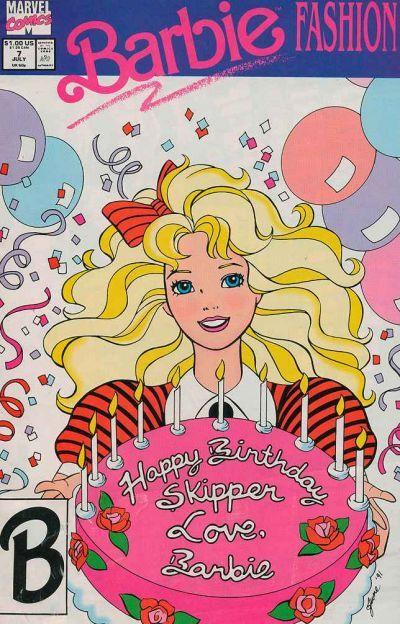Trina posted this comment comment during our Wonder Woman roundtable a while back:
The problem definitely seems to be that the mainstream two do not know how to market to girls and women. Back in the 90s when I was one of the writers on Barbie comics for Marvel, their only advertising was in their own comics. Then, on Barbie’s 30th anniversary, my editor got an agreement with Toy R Us to have various Barbie creators do a one-day signing and appearance in their various stores and of course sell the comics. (The comics had NOT been for sale at those toy stores or at ANY toy stores, only for sale in comic book stores!) So I showed up at our local TRoys R Us and they had a nice display with the comics and a cute throne-like chair for me to sit, and people came in and saw the comics and went “Wow, I never knew there were Barbie comics! And look, they’re only 75 cents! Let’s buy some for our daughter/ neice/ granddaughter, etc.” and the comics sold out! Marvel did NOT follow up and start distributing the comics through toystores, and of course eventually they cancelled the line because it wasn’t selling enough. Makes you want to bang your head against a wall!
Noah, while some books in the Minx line were [perfectly fine, others made me wonder if the editor understood whom she was selling to. The books got edgier and adgier until there was one (I think it was called “Shark Girl”) about a surfer girl who lost her heg to a shark — a potentially great premise — but it included erotically charged scenes of girls in the world’s briefest bikinis, the kind of stuff that parents, if and when they saw the books, would have a fit.


After reading this, part of me wonders if Marvel picked up the Barbie license just to keep it away from other publishers. It’s not an unusual strategy among media companies, particularly those conscious about market share. The license was at Marvel during the Tom DeFalco era, when Marvel’s dominance over DC wasn’t always a given, and companies such as Image, Valiant, and Dark Horse began cutting signifcantly into the Big Two’s share of the pie.
As for getting the comics into toy stores, Marvel may have decided it wasn’t worth the hassle. Jim Shooter, who dealt with these issues at both Marvel and Valiant, had this to say about the challenges of toy-store distribution:
The link is here.
Huh. That’s interesting.
It sounds like the products kind of did blow out the door, though….
The response at a signing can be misleading. The test is how things go when there isn’t a special event. When I first started working in publishing, I spent a good deal of time helping the cookbook editor coordinate author signings and demos at stores and other outlets. It wasn’t unusual for the books to blow out the door during the event, and then collect dust until the returns were bound up for shipping.
Thanks for posting Jim Shooter’s tale of the travails that would’ve been involved in “selling into Toys R Us or any big retail chain,” Robert.
And a comics store dominated by giant posters of Lady Death and other thongs-and-garters clad, pneumatic “superheroines” is not exactly the kind of environment that parents would approve of for their kids, either.
Alas, for the days of “spinner racks”! Where there weren’t umpteen dozen titles spewed out from every company, and these racks — to be found on newsstands, drugstores, etc. — carried a nice variety of comics, not only Marvel, DC, and Gold Key, but Archie and Harvey. Easily manageable and accessible, not taking up much valuable retailer floor space, encouraging browsing by kids whose parents were occupied with their other purchases, the kids then bugging Mom or Pop to buy the comics…
( http://romspaceknightart.blogspot.com/2011/02/comic-book-spinner-racks-hot-damn-i.html mentions they were also to be found in “the magazine sections of liquor stores, 711s, five n dimes and other general stores.”)
If they don’t know how to produce good comics then they certainly aren’t going to know how to market good comics.
That’s not necessarily true, though. Marketing and producing are different skill sets…I think you could easily have one without the other….
I was thinking more on the line of the mainstream comics industry where it’s really hard to think of anything they’ve done right in either side of the coin. In the book and movie industries, on the other hand, sure there’s been plenty of bone-headed moves but also plenty of smart ones.